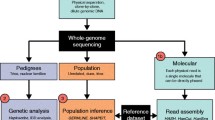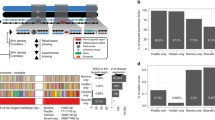Abstract
Human genomes are diploid. To link genetic variation to gene function and phenotype, it is essential to determine the specific distribution of variants between the two homologous chromosomes. Here we present a fosmid pool-based next generation sequencing approach to haplotype-resolve whole genomes and its application to the analysis of multiple individuals. In sum, our work provides novel insights into the true nature of genetic variation and exemplifies that haplotyping human genomes is mandatory to fully understand the biology of genes and genomes, identify disease mechanisms and advance individualized medicine.
Similar content being viewed by others
Literatur
Hoehe MR (2003) Haplotypes and the systematic analysis of genetic variation in genes and genomes. Pharmacogenomics 4:547–570
Tewhey R, Bansal V, Torkamani A et al. (2011) The importance of phase information for human genomics. Nat Rev Genet 12:215–223
Suk E-K, McEwen G, Duitama J et al. (2011) A comprehensively molecular haplotype-resolved genome of a European individual. Genome Res 21:1672–1685
Duitama J, McEwen G, Huebsch T et al. (2012) Fosmidbased whole genome haplotyping of a HapMap trio child: evaluation of single individual haplotyping techniques. Nucleic Acids Res 40:2041–2053
Hoehe MR, Church GM, Lehrach H et al. (2014) Multiple haplotype-resolved genomes reveal population patterns of gene and protein diplotypes. Nat Commun 5:5569
Suk E-K, Schulz S, Mentrup B et al. (2016) A fosmid poolbased next generation sequencing approach to haplotyperesolve whole genomes. Methods Mol Biol (im Druck)
Author information
Authors and Affiliations
Corresponding author
Additional information
Margret R. Hoehe, Eun-Kyung Suk und Thomas Huebsch (v. l. n. r.) Im Fokus der Arbeitsgruppe „Diploid Genomics“ unter Leitung von Dr. Margret Hoehe ist die Entwicklung molekulargenetischer und bioin - formatischer Ansätze/Methoden zur Haplotyp - analyse menschlicher Genome, sowie deren Anwendung auf die Datenproduktion und -ana - lyse in großem Maßstab (Molekulargenetik Dr. Eun-Kyung Suk, Bioinformatik Dr. Thomas Hübsch). Mit gegenwärtiger Schwerpunktsetzung auf die Datenanalyse werden Gesetzmäßigkeiten zur Natur genetischer Variabilität und der Architektur diploider Genome, sowie deren Implikationen für Biologie, personalisierte Genomik und Medizin untersucht. Dr. Suk war bis 2012 Mitglied der Arbeitsgruppe.
Rights and permissions
About this article
Cite this article
Hoehe, M.R., Suk, EK. & Huebsch, T. Haplotypsequenzierung menschlicher Genome. Biospektrum 22, 577–581 (2016). https://doi.org/10.1007/s12268-016-0730-z
Published:
Issue Date:
DOI: https://doi.org/10.1007/s12268-016-0730-z




